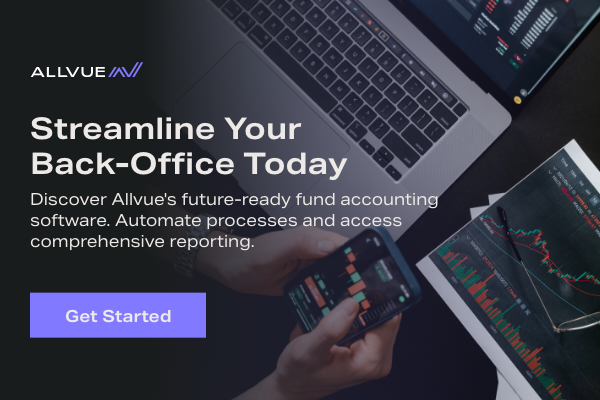February 10, 2023
Shadow accounting is the widespread practice of keeping a separate set of financial records. Fund accountants do it for all sorts of reasons, but the most common is to verify numbers calculated elsewhere. Private equity, venture capital, and other investment partnerships that outsource their fund administration to a third-party provider will often keep shadow accounts for assurance. In Europe and the UK, where outsourcing fund administration is commonplace, shadow accounting is standard practice.
Improvements in technology and better integrations between private capital partnerships and their administrators can simplify the work of shadow accounting, making it more of an audit function than a bookkeeping one.
What is shadow accounting?
Shadow accounting is the practice of keeping a second set of financial records to verify information in the primary books or to make management decisions that are not supported by the general ledger.
Shadow accounting is a standard accounting technique
While the word “shadow” may make it seem as though shadow accounting is something secretive, it is actually a widely used, standard practice for better back-office management across a variety of industries and organizational types.
| Segment |
Use Case |
| Private Capital |
Verify financial reports |
| Insurance |
Calculating asset values |
| Management |
Tracking budgets |
| Sales |
Compensation |
The reasons for maintaining shadow books varies by industry and job function. In the private capital space, investment funds maintain shadow systems to verify records kept by third-party administrators.
Insurance companies often leverage shadow accounting to calculate asset values based on market prices to manage insurance liabilities. GAAP accounting records assets at the lower of cost or market, but risk managers need the higher value to maintain accurate reserves for losses.
In many large organizations, shadow accounting helps department managers track budgets because the enterprise system doesn’t create reports in a format that the managers can use. After all, tracking the flow of funds at organizations with thousands of employees is a massive challenge. Department heads looking for up-to-date data for a small business unit will probably need to keep a separate set of records to stay on top of their spending.
Finally, account executives and other sales team members in many organizations keep their own records of sales and commissions to ensure that compensation is calculated correctly.

DOWNLOAD WHITEPAPER: CO-SOURCING IS A WIN-WIN FOR FUND MANAGERS
Funds use shadow accounting for verification, risk management, and investor communication
Shadow systems in private equity funds serve as an oversight layer between a general partnership and its fund administrator. It is a practice that helps catch errors sooner and smooth regulatory relationships. In addition, private equity funds often use shadow accounting to generate data used for risk management. The investment team keeps its own records of assets and liabilities to assess risk parameters in real time. This ensures that the vital work of portfolio management continues free of interruption.
In fact, many limited partners require outsourced fund administration in order to invest with a general partner. But for GPs, record sharing with fund administrators can be cumbersome. Shadow systems can help funds respond to investor requests even after passing the rest of the administrative services over to a third party.
Because shadow accounting is a step down from the official records, private equity firms often try to do it in an off-the-shelf accounting system. The thought is that the records don’t have to be quite as usable, but the result is that records are almost impossible to use for decision making or are littered with embedded errors. Purpose-build enterprise fund accounting software systems and many fund administrator offerings include tools that make shadow accounting less of a burden and, in some cases, turn it into an auditing function rather than duplicate bookkeeping.
Evolving technology can improve shadow accounting and even eliminate the need for it in a private capital firm. For example, Allvue’s Client Hub allows fund managers to access the same general ledger shared with their administrator. Then, the general partner’s team members can generate reports from that same single source of truth data and easily share them with their investors and other key stakeholders. They can also export the data or build dashboards and reports through Power BI capabilities to quickly gather actionable insights. The general partner has access to its data while enjoying the benefits of third-party accounting services.
Another trend that is replacing shadow accounting in the United States is co-sourcing. With co-sourcing, the investment information system is installed at the general partner firm, which gives the administrative firm log-in access. The GP retains the data and can verify the administrator’s work, which in many cases eliminates the need for shadow accounting processes.
Watch: Co-Sourcing Explained
By keeping the data in a single source of truth, fund administrators and fund managers can execute their workflows without duplicating efforts or introducing errors. Technology can help convert shadow accounting from a bookkeeping chore into a streamlined auditing and business intelligence process.


